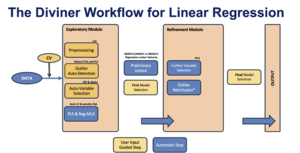Diviner: Difference between revisions
No edit summary |
|||
| Line 3: | Line 3: | ||
==Diviner== | ==Diviner== | ||
Diviner is a semi-automated machine learning (Semi-AutoML) tool specifically designed to enhance the development of multivariate calibration models for linear regression. Unlike traditional AutoML systems that fully automate the machine learning workflow, often at the expense of domain-specific insights and transparency, Diviner strikes a balance between automation and expert involvement. It allows users to leverage automation efficiently while maintaining control over critical decision points in the modeling process. This hybrid approach addresses key shortcomings of AutoML, such as the lack of domain knowledge, overfitting, and limited customization, by integrating user input to guide model development more effectively.'''Bold text''' | '''Diviner''' is a semi-automated machine learning (Semi-AutoML) tool specifically designed to enhance the development of multivariate calibration models for linear regression. Unlike traditional AutoML systems that fully automate the machine learning workflow, often at the expense of domain-specific insights and transparency, Diviner strikes a balance between automation and expert involvement. It allows users to leverage automation efficiently while maintaining control over critical decision points in the modeling process. This hybrid approach addresses key shortcomings of AutoML, such as the lack of domain knowledge, overfitting, and limited customization, by integrating user input to guide model development more effectively. | ||
Diviner is focused on calibrating partial least squares ('''PLS''') and regularized ('''elastic net''') multiple linear regression ('''MLR''') models. It offers a workflow combining outlier overview, preprocessing grid search, and variable selection with user-guided model refinement. | |||
[[File:Diviner workflow.png|thumb]] | |||
'''Bold text''' | |||
===Sub section=== | ===Sub section=== | ||
Revision as of 10:24, 9 September 2024
Page under construction
Diviner
Diviner is a semi-automated machine learning (Semi-AutoML) tool specifically designed to enhance the development of multivariate calibration models for linear regression. Unlike traditional AutoML systems that fully automate the machine learning workflow, often at the expense of domain-specific insights and transparency, Diviner strikes a balance between automation and expert involvement. It allows users to leverage automation efficiently while maintaining control over critical decision points in the modeling process. This hybrid approach addresses key shortcomings of AutoML, such as the lack of domain knowledge, overfitting, and limited customization, by integrating user input to guide model development more effectively.
Diviner is focused on calibrating partial least squares (PLS) and regularized (elastic net) multiple linear regression (MLR) models. It offers a workflow combining outlier overview, preprocessing grid search, and variable selection with user-guided model refinement.
Bold text
